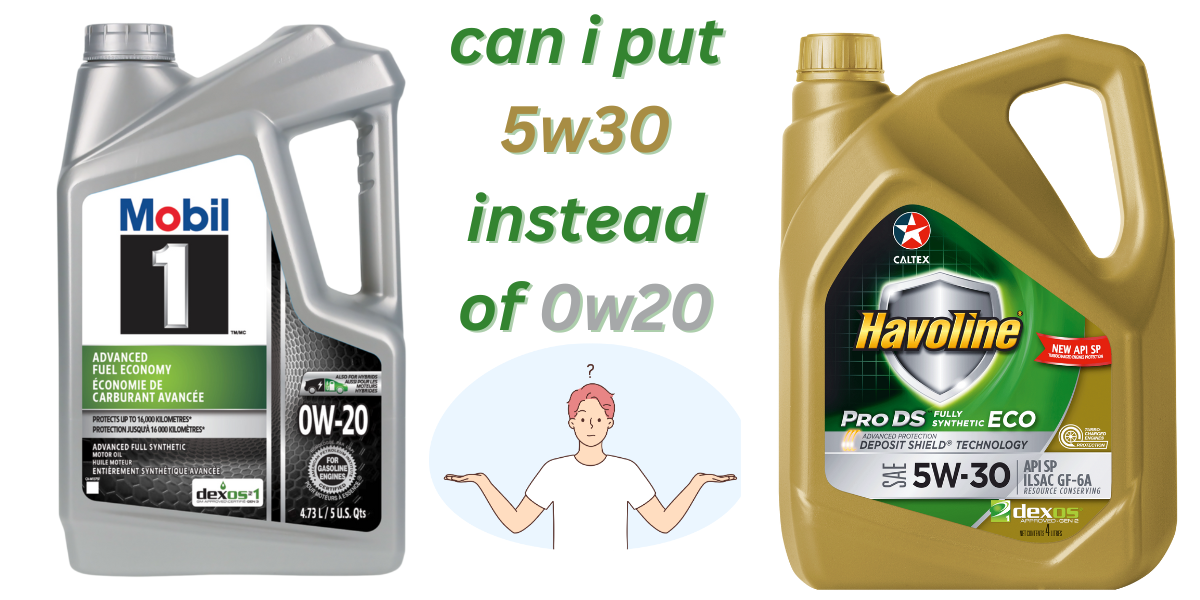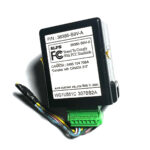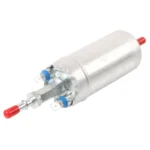A common question comes in every car enthusiast mind that can i put 5w30 instead of 0w20. Yes, you can use the 5W30 oil in your engine instead of 0W20 without any damage. Some car models specify 5W30 in place of 0W20.
In the US, 0W20 oil is used for fuel efficiency reasons. However, 5W30 will not have a significant impact on gas mileage. It may only affect it by a fraction of 1%.
Table of Contents
Let’s take a look at the differences between 5W30 and the 0W20 oil, and compare them thoroughly.
Contents hide 1 Comparison of 5w30 and 0w202. Advantages And Disadvantages When Using It Instead Of The 0w202.2.1 Better protection in high temperatures2.1.2 Enhanced wear protection2.1.3 Suitable For High-Mileage Cars2.1.4 Lower Oil Consumption2.2.4 Limited Warranty Compliance2.2.5 Not suitable for some modern engines3 FAQs3.1 Can I use 5w30 in place of 0w20 on my 2012 Highlander?3.2 Can I switch from 0w20 to 5w20 to
Compare 5w30 and 0w20
Let’s first take a look at the properties and applications of each oil before we compare them.
| Property | 5W30 | 0W20 |
| Viscosity | It is suitable for older engines and moderate climates. | The thinner the material, the better it is for fuel efficiency in colder climates. It also protects modern engines. |
| Cold Start | It is ideal for colder climates as it offers good cold-start performance. | It is ideal for cold climates as it flows easily during cold starts. This reduces wear and tear. |
| Fuel Efficiency | Fuel economy is slightly lower than 0W20 because of its higher viscosity. | Fuel efficiency is improved, resulting in better mileage and lower emissions. |
| Engine protection | It provides a robust protection from wear in engines older than 10 years with looser tolerances. | The new design is designed to protect modern engines that have tighter tolerances and reduce friction, while enhancing longevity. |
| Temperature range | Ideal for temperatures in moderate climates. | Ideal for colder climates but can also be used in moderate temperatures. |
| Vehicle Compatibility | It is often recommended for older and high-mileage vehicles, which do not require ultra-thin oil. | Often specified on newer vehicles with advanced engine technology. |
Benefits and Disadvantages of Using 5w30 instead of 0w20
In one sentence, it is difficult to decide whether or not you should switch from 0w20 5w30. There are both pros and cons. You can be confident in your decision if you know both sides.You can also read about the oil debate: Can I use 15w40 instead of 5w20?
Benefits of using 5w30 instead of 0w20
Protect yourself from high temperatures
The viscosity of 5W30 engine oils is higher at higher temperatures than 0W20. This provides better protection to the engine in extreme heat conditions. This is especially beneficial for vehicles that operate in hot climates, or with heavy loads.
Wear Protection Enhancement
5W30’s slightly thicker viscosity can provide better wear protection in older engines, particularly those with less precise tolerances and/or higher mileage.
Fit for Vehicles with High Mileage
It is recommended that high-mileage cars use 5W30 because it helps to reduce the effects of wear on engine components.
Reduced oil consumption
Some cases, 5W30 oil can reduce oil consumption when compared with thinner oils such as 0W20. The thicker viscosity is able to better resist evaporation, which results in better engine retention.
Advantages of Using 5w30 instead Of 0w20
A Slightly Lower Fuel Economy
Because of its viscosity, the 5W30 oil may have a slightly lower fuel economy than 0W20. The thicker oils may create more internal resistance which could result in a slight decrease in gas mileage.
Cold Start Performance
0W20 has been specially formulated to flow easily at low temperatures. This makes it perfect for cold starts. Although 5W30 offers a good cold-start performance, in frigid climates it may not be as effective. This could lead to increased wear on the engine during start-up.
Limited Warranty Compliance
To maintain warranty coverage, some vehicle manufacturers specify specific oil grades such as 0W20. If you deviate from the manufacturer’s recommended oil viscosity, it could void your warranty.Check out Can you use G40 coolant instead of G12?
Some modern engines are not compatible with this product
Some newer vehicles are designed for optimal performance with thinner oils, such as 0W20. This is especially true of those with advanced engine technology, like turbochargers or direct injection.
The role of synthetic oils
Synthetic oil is a type of engine oil that is derived from crude oil byproducts and alternative raw materials. These oils are made from synthetically created chemical compounds like polyalphaolefins (PAO), which are produced by polymerizing molecules such as Ethylene. Synthetic oils are designed to provide exceptional protection and lubrication, especially in conditions of high temperatures and performance requirements.
Synthetic oils are superior to conventional oils when it comes to engine wear protection, and they can withstand a greater range of temperatures. This is due to the uniformity of the molecules in synthetic oil, which can be achieved by using higher-quality base oils. The result is improved engine performance.
Benefits of synthetic oils
Synthetic oils have a variety of benefits that can enhance engine performance. They have a longer life span, are better at cleaning and lubricating, and can be mixed with conventional oils in some cases. They are also engineered in laboratories to ensure consistency. Synthetic oils improve engine performance because they can withstand higher temperatures and flow better at cold temperatures. They also provide better protection and engine performance, reduce friction between engine parts, and are specifically engineered to ensure optimal lubrication.
Synthetic oil also improves fuel economy by reducing friction in the engine, using friction modifiers and other additives, as well as incorporating “moly” additives. This can lead to an increase in mileage of 3 to 15%.
Synthetic oil can also extend the life of an engine. It provides enhanced protection for the engine and has a longer lifespan when compared with conventional oil.
Common Synthetic Oil Viscosities
The viscosity of oil in comparison to synthetic oils indicates the level of flow resistance. The viscosity of the oil determines its flow rate, which in turn affects the ability to protect the engine. Viscosity index (VI) is used to indicate the viscosity of synthetic oils. Viscosity is affected by various factors, including:
- The type of base oil that is used
- Additives mixed with
- The temperature and pressure to which they are exposed
- The shear rate
- Condition and age of the oil
The most common viscosity of synthetic oil, especially for modern engines is 5W-30. This rating is a good balance for both cold temperatures and warm days. It’s suitable for all climates.
Choose the right oil for your vehicle
It’s not enough to simply grab an oil off the shelf. Understanding your vehicle’s needs is important, as it involves taking into consideration factors like the manufacturer’s recommendation, driving conditions and climate where you live. The first step is to consult the owner’s guide of your vehicle.
Checking the Owner’s Manual of Your Vehicle
The owner’s guide for your vehicle provides detailed information about the recommended oil. The manufacturer has conducted extensive tests and research to ensure that the recommended oil is the best for lubricating and protecting the engine. You’ll learn about:
- How to check your oil level
- What type of oil filter is recommended?
- Oil changes at regular intervals
- Recommended oil viscosity for each engine type
These recommendations are tailored to the specific needs and characteristics for each model of vehicle. Adhering to these recommendations will ensure:
- Optimal performance
- Safeguarding the engine
- Reduce friction and wear
- eliminating contaminants
- Contributing to the longevity of your engine.
Consideration of Ambient Temperature in Climate
The climate and temperature of the place you live and the vehicle that you drive the most can have a significant impact on the engine oil selection. It is recommended to use engine oils that have a higher viscosity in hot climates. These include 5W-40 and 5W-50. These oils can withstand high temperatures and not lose their viscosity, which ensures optimal engine lubrication.
The best engine oils to use in cold climates include Mobil 1 Synthetic Motor Oil, any 0w XX ILSAC, and 0w-20 because they flow exceptionally well.
How to Assess Your Driving Habits
The type of engine oil you choose can be affected by your driving habits and conditions. Cold starts can be caused by frequent short trips, resulting in increased wear on the engine and more condensation. This can reduce oil efficiency. High speeds and aggressive driving can cause the engine to be stressed, leading to higher temperatures and oil consumption.
When driving in dusty conditions or sand, the oil can be contaminated with sand and dust particles. This can cause premature wear to engine parts. A thicker oil, such as 10W-30 and 5W-40, is recommended if you tow or haul heavy loads frequently. It provides better protection and stability in high load conditions. It is important to choose an oil that provides adequate protection in these conditions.
Regular oil changes are important
Oil changes are important for the performance of your engine. They:
- Improve fuel efficiency
- Ensure a cleaner engine
- Improve engine efficiency
- Engine life can be extended
Oil changes are dependent on many factors. These include the type of engine oil, the age, condition and manufacturer’s recommendation, as well as the conditions of driving.
Oil changes are recommended for vehicles every 5,000-7,000 miles or 6 months.
How often should you change your oil?
Oil changes are affected by the type of oil, the age and condition of the engine, and driving conditions. Synthetic oils have a longer lifespan and can last longer between oil changes than conventional oils. This is according to the manufacturer’s recommendation outlined in the owner’s manual.
The following driving conditions can cause engine oil to degrade faster and require frequent oil changes:
- Short distance driving is a frequent occurrence
- Encountering stop-and-go traffic
- Operating in extreme temperatures
- Towing heavy loads
FAQs
Can I use 5w30 in place of 0w20 on my 2012 Highlander?
It is okay to use 5W30 in place of 0W20 on the 2012 Highlander.
Can I change to 5w30 in my 2012 Corolla from 0w20?
You can change to 5W30 in your 2012 Corolla from 0W20. In general, it is acceptable to use slightly thicker oil.
The conclusion of the article is:
In certain circumstances, using 5W30 in place of 0W20 is a good option. Although 5W30 has advantages in terms of high-temperature protection, wear resistance and lubrication, it is still important to follow the manufacturer’s recommendation and consider climate conditions for optimal engine performance.
Related post: John deere hydrau equivalent










